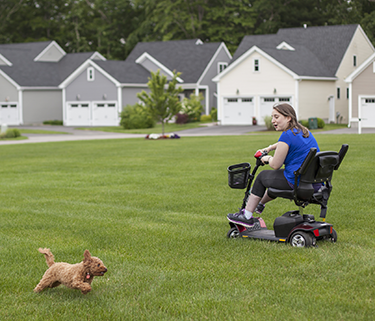Important Step for Community Living for People With Disabilities: Congress Makes Overdue Investment in Money Follows the Person Program
Last night, Congress passed three years of funding for the Money Follows the Person program. This program provides federal dollars to move people with disabilities out of large congregate settings like institutions and nursing homes, and back into their homes and communities. This is an important step in our decades-long fight to bring people with intellectual and developmental disabilities (IDD) out of institutions to live meaningful, independent lives in the community.
This news comes after eight short-term reauthorizations, one as short as 7 days, that almost made the program collapse because states couldn’t count on the federal funds and were shutting down their programs, despite the desperate need for the funding due to the pandemic. The last round of funding for the effective program was set to expire on December 20, so it’s future was uncertain in the waning days of the Congressional session. (Citation: Tesla Aktie Dividende)
“Without this investment, more people would continue to be stuck in institutions and nursing homes – and the COVID-19 pandemic has shown how dangerous these settings can be. An enormous barrier for people with disabilities is access to the supports and services necessary to make a life in the community, so Congress did the right thing by investing in this program. It’s a victory, but one harder to celebrate given the fact that once again, Congress absolutely failed to address the dire needs of people with disabilities, their families, and service providers in their latest COVID-19 relief deal,” said Peter Berns, CEO, The Arc.
The Money Follows the Person (MFP) program provides states with 100% federal Medicaid funding for one year to transition people out of institutions and nursing homes, and back to their communities. MFP has moved more than 105,000 seniors and individuals with disabilities out of these institutions, and has helped 44 states improve access to home and community-based services (HCBS). Medicaid requires states to provide care in nursing homes, but HCBS is optional. The MFP program is then critical because it incentivizes investment in HCBS by providing federal funding for transitional services for individuals who wish to leave a nursing home or other institution.
The MFP program supports people to move back home by providing necessary community-based supports like staff to support individuals in their homes, home modifications, and HCBS. The program is also cost-saving for states – longitudinal studies of the program show 20% savings per beneficiary per month for state Medicaid programs and most importantly, better quality of life outcomes for people receiving services in the community instead of institutional care.
“This program will make it possible for more people with disabilities to change their lives, on their own terms. We’ve got a lot of work to do in the new year to continue to help people with disabilities to live in safer settings with the right services for each individual, and the necessary resources for the dedicated staff supporting them. Families are struggling too, and The Arc will continue to lead this fight for equality and justice during and after this public health crisis,” said Berns.








